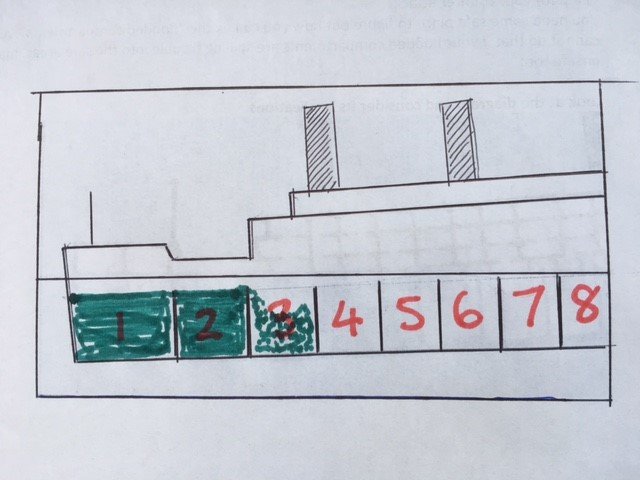Coping With Stress
Coping With Stress
It is important to learn how to handle stress, because you cannot avoid all stressful situations.
You can handle stress by compartmentalising your mind and by breaking your experience into clear, distinct and separate compartments.
Your mind can be likened to a ship, that is sailing on the seas of life.
- Sometimes the going is good and the winds are in your favour; the sea is calm and the weather is fine and sunny. Life seems to be all plain sailing.
- Other times the going is NOT so good. The winds are against you, the sea is rough and the weather is stormy. Life seems to be stressful, stormy and dangerous.
Sometimes, as you know, ships encounter dangerous, giant icebergs.
In 1911, The Titanic famously hit an iceberg and sea-water flooded into the body of the ship.
Nobody knew that the Titanic had a fatal flaw in its design, in that it did not have fully water-tight bulkheads. Consequently, water flooded from one compartment to the next, to the next, to the next. Each compartment flooded, and then fed sea-water to the adjoining compartment until the whole ship was lost, and it sank.
Think of the construction of a ship. Since that time, all ships have built, within their structure, a number of fully water-tight bulkheads. These watertight bulkheads prevent sea-water flowing from one compartment into the next; so flooding the whole ship.
Your mind should have the same set up. Your mind can be likened to a ship, that can either have water tight bulkheads, or not.

Most people's minds do not have watertight bulkheads, so that any problem in one area of the person's life soon overflows into the other adjoining compartments and causes the whole ship to flounder and then sink.
Example: George has a problem at work, and the work problem ends up with a big argument between George and his boss, Alison. George goes home worried about the work-related problem and is annoyed with Alison.
When he gets home he is irritable with his partner. He feels argumentative and short tempered and complains that he does not like the dinner she has prepared. They have an argument. George says things he should not say.
He leaves the house and goes out for a drink with a friend. He drinks too much. He gets drunk. He falls over on the way home and severely twists his ankle. Now he cannot walk. He makes his way to the hospital A & E and spends the night waiting to be seen. He limps home at 2am.
When he gets home he has another row with his wife. George sleeps in the spare room. He oversleeps and wakes up at 9.30am. He calls in sick. His boss is suspicious about his "sickness" and they have another row. George puts the phone down and says, "Why does everything happen to me!"
Everything seems to happen to George because he failed to compartmentalise his problems. He allowed the work-problem to flow into an argument with his boss, which then flowed into an argument with his partner, which then led him into drinking too much, which flowed into an ankle injury, which then flowed into a late arrival home, which led to another argument, which led to oversleeping, which led to work absence; which led to another argument.
Poor George allowed the first event to be the trigger for a Titanic-type disaster: Trouble in one compartment flooded the next and so on until the whole ship sinks.
What is the solution?
The solution is to have water tight compartments built into your brain. If there is trouble in one compartment, DO NOT allow that to overflow into the next compartment.
Instead, separate your life into sections and keep them isolated. So, if one thing goes bad, it goes bad on its own. You retreat to the safe zones. You protect the safe zones and keep them sacrosanct, for example:
- If there is trouble at work, DON'T take it home and use that as a reason to be harsh to the family.
- If there is trouble at home, DON'T take it to work and use it as an excuse to be harsh to people at work.
- If there is trouble at work AND at home, DON'T use that as an excuse to abuse your health by drinking too much alcohol.
Instead, if there is trouble at home and at work, then use the gym as your sanctuary and make yourself as strong and powerful as you can be.
The non-affected areas of your life need to be kept away from the affected areas and used as a base-camp for your counter attack.
You need a safe place to figure out how you can fix the "flooded compartments". And you cannot do that if your flooded compartments are spilling trouble into the safe areas, making them unsafe too.
Look at this diagram and consider its implications.

Blogs by Email
Do you want to receive an email whenever we post a new blog? The blogs contain article 5-10 minutes long - ideal for reading during your coffee break!
Further Reading in Stress Management
-
Coping With Stress
Stress cannot be avoided, so learn how to handle stress by keeping your different experiences in distinct and separate compartments.
Read Article > -
How to Handle Stress
Not all stress is bad for you. Stress can be good for you. It depends on what kind of stress it is; and how you deal with it.
Read Article > -
The Eight Minute Holiday: Stress Management System
Experience tranquillity without waiting for holidays through the "8-Minute Holiday" stress management system, transforming downtime into moments of serenity within your workday.
Read Article >
Looking for Leadership and Management Training?
If you're looking to develop your Stress Management Skills, you may find this Leadership and Management Training Course beneficial:
Open Training Course Pricing and Availability
Next Open Course Starts in 3 days, Online - Teams, places available





